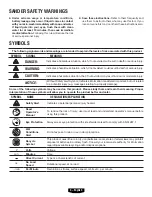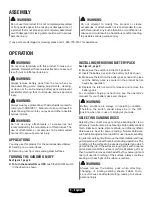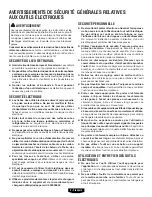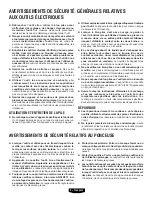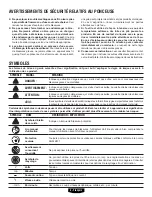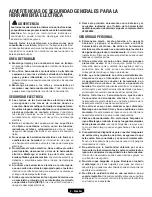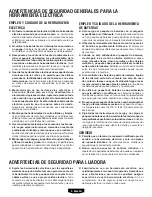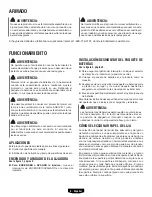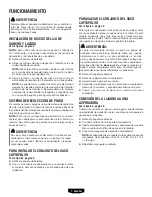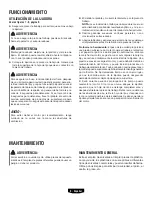
7 – English
OPERATION
MAINTENANCE
WARNING:
To ensure proper brake operation after extended use,
periodically check its operation by removing the sanding
disc, running your sander without load (off the workpiece)
and then turning the sander off. The backing pad should
not take longer than 6 seconds to stop. If it takes longer
than 6 seconds to stop, return the sander to your nearest
Authorized Service Center for repair. Failure to do so may
result in minor injury.
NOTICE:
To avoid damaging the motor from overheating, be
careful not to let your hand cover the air vents.
Turn on the sander and move it slowly over the workpiece.
NOTE:
The speed of orbit observed during use is de
-
signed to give optimum results, and is not an indicator
of the tool’s actual sanding performance.
Make successive passes in parallel lines, circles, or
crosswise movements.
Turn the sander off and wait until it comes to a complete
stop before removing it from the workpiece.
Do not force.
The weight of the unit supplies adequate
pressure, so let the sanding disc and sander do the work.
Applying additional pressure slows the motor, rapidly wears
the sanding disc, and greatly reduces sander speed. Exces
-
sive pressure will overload the motor, causing possible
damage from motor overheating, and can result in inferior
work. Any finish or resin on wood may soften from the fric
-
tional heat. Do not allow sanding on one spot too long, as
the sander’s rapid action may remove too much material,
making the surface uneven.
Extended periods of sanding may tend to overheat the
motor. If this occurs, turn sander off and wait until sanding
disc comes to a complete stop, then remove it from work
-
piece. Remove the hand from vent area, remove sanding
disc, then with the hand removed from vent area, turn sander
on and run it free without a load to cool the motor.
WARNING:
When servicing, use only identical replacement parts.
Use of any other part could create a hazard or cause
product damage.
GENERAL MAINTENANCE
Avoid using solvents when cleaning plastic parts. Most
plastics are susceptible to damage from various types of
commercial solvents and can be damaged by their use. Use
clean cloths to remove dirt, dust, oil, grease, etc.
NOTE: ILLUSTRATIONS START ON PAGE 9
AFTER FRENCH AND SPANISH LANGUAGE SECTIONS.
Summary of Contents for HPSD01
Page 22: ...NOTES NOTAS ...
Page 23: ...NOTES NOTAS ...




